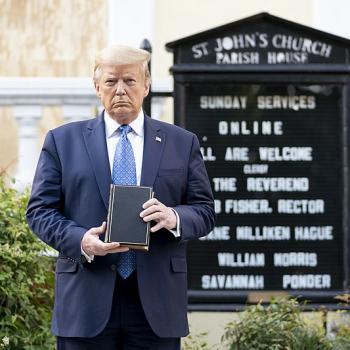Augustine for bishop? Probably not. But why not? The answer lies in the good bishop's behavior—and in the state of the church.
One: Augustine left a paper trail.
Plausible deniability or, at the very minimum, a good deal of ambiguity and silence is a real asset in getting elected bishop today. Sure, the search committee and others will throw you a softball question or two. They will ask what you do with your free time and how you stay healthy spiritually. But these are obligatory questions. Everyone asks them and no one cares very deeply about the answers. You won't have any free time as a bishop anyway and what you do to stay connected with God is your own responsibility.
It's when the committee and others start asking the hot-button social questions that the gloves come off and people begin paying attention. Pens are poised, notes are taken, and the aspiring bishop is on the hot seat. That's when it's good to trip the light fantastic. The best answers at a time like that are those pliable, Gumby-like responses that leave everyone feeling that a given candidate is in "their corner."
The problem with leaving a paper trail is that it forces you to say something definitively and, if you've done that, your candidacy is in the tank. Your words will be quoted back to you.
So, there is no way we are electing Augustine today.
Second: Augustine thought deeply.
A wordy man or woman is a person who is thinking too much. That kind of person can't connect with people in the pew.
Intellectual pursuits are a fashion statement—a bit like The New York Times bestseller list: widely purchased, little read. We all know that people like Augustine are out of touch and incapable of meeting the needs of the church.
If you are going to write, it is better to be clever or British. In the United States it just doesn't work, unless, of course, you have a British accent. Then you can say almost anything and get an audience, but it doesn't happen often and it isn't convincing if you have to admit you are from Pittsburgh.
Augustine made theological arguments and gave careful, sustained attention to complexities. (Have you noticed how long The City of God is?) Such matters in the modern world, if mentioned at all, are better used as proof texts for positions already taken on the strength of experience.
There is no way we are electing Augustine today.
Third, Augustine wasn't willing to find a way for the Donatists to feel good about themselves. In fact, he used words like apostasy and heresy.
How narrow can you be? The signs say, "Our church welcomes you"—not "you with conditions," just "you." It doesn't say, "you are welcome, but God is going to expect things or change things." It just says "you"—meaning me, me, me. Other church mottos announce we have "open minds, open hearts, open doors." The operative word here is "open." No narrow gates, no eye of the needle. Open. How open can you be using language like apostasy and heresy?
If you are going to get through a modern episcopal election, don't use words like apostasy or heresy. Tell them, "Our life together isn't shaped by theology. It is shaped by our liturgy." It won't occur to the committee for months that liturgies use words, words frame thoughts, and thoughts are inherently theological.
No, there is no way we are electing Augustine today.
So, what am I trying to say? Am I saying that today's bishops are a bankrupt, hopeless bunch? No.
Am I saying that they are without gifts, without intelligence, without deep spiritual commitments? No.
Am I saying that none of them are faithful and effective? No. (So, please don't write to tell me that your bishop is. That's not the point.)
Am I saying that they should be as memorable as Augustine? No, that kind of thing is in the hands of God.
What I am saying is that we have created an ecclesial climate in which it is hard to elect bishops who have the gifts of an Augustine and nearly impossible for them to live like Augustine—even if they do possess those gifts and get elected. That needs to change.
We need to encourage our bishops to be reflective, clear, and decisive, even if we don't always agree with them. Loud and public complaints about every decision a bishop makes only creates a cadre of people unwilling to make decisions. This will require that clergy accept their bishops acting like bishops and bishops who are as transparent as possible about the decision-making process with their clergy.
We need to support them in their endeavors faithfully to represent the Gospel. Bishops do not fall out of the sky, nor do they develop new theological capacities when they are ordained or consecrated. If they are not formed in the faith that may say more about our churches than it does about our bishops.





